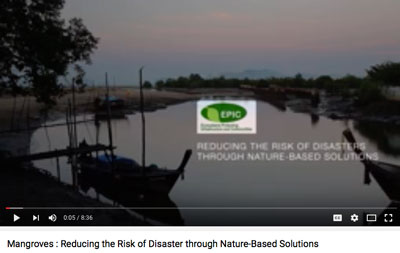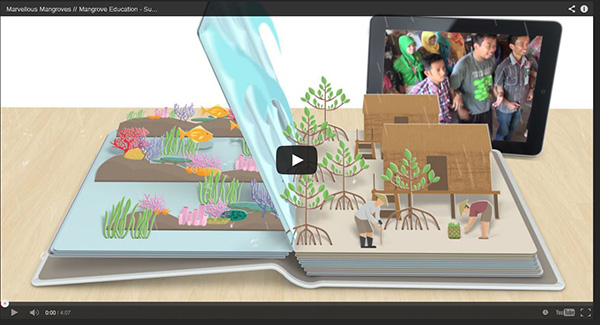MAP News Issue 424 – September 2, 2017
The MAP News | |
FEATURE STORY
ASEAN tackles mangrove management 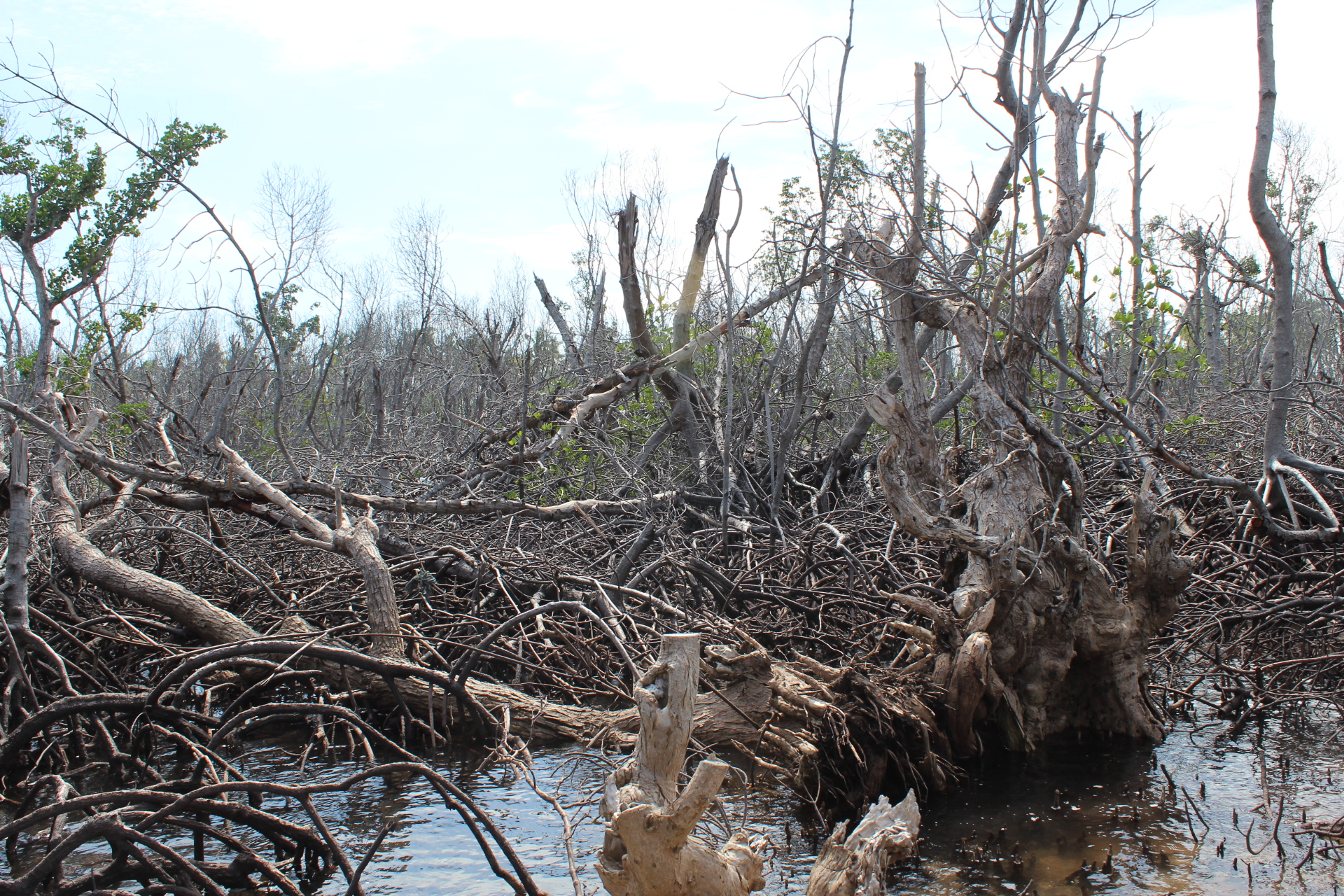 PHILIPPINES – The Association of Southeast Asian Nations (ASEAN) will try to work out a collaborative sustainable mangrove management in the region amid climate change in a Mangrove Congress September 4-8 in Manila. The Department of Environment and Natural Resources-Ecosystems Research and Development Bureau (DENR-ERDB) will hold the 2nd ASEAN Congress on Mangrove Research and Development with the theme “Sustainable Management of Mangroves in the course of Climate Change.” “Mangrove habitats represent both a vulnerable resource and a potential deterrent to the effects of climate change. Sea level rise poses a major threat to mangrove ecosystems as it induces erosion and weakening of root structures, increased salinity, and mangrove inundation,” the ERDB said. Mangroves have been recognized to play an important role as a barrier against storm surges as what has been observed during Super typhoon Yolanda in 2013. “Mangroves are also known to attenuate waves by as much as 75 percent through its vast underground root networks and high vegetation structural complexity,” according to Anna McIvor, team leader of the study titled “Storm Surge Reduction by Mangroves.” READ MORE AFRICA ‘Mangroves are environmental indicators, carbon-foot’  GAMBIA – The National Environment Agency (NEA) is implementing the United Nations Development Programme (UNDP) and Global Environment Facility (GEF) Least Developed Countries Development Funds (LCDF) Project “Enhancing Resilience of Vulnerable Coastal Areas and Communities to Climate Change in the Republic of The Gambia”. The objective of the project is to reduce Gambia’s vulnerability to sea-level rise and associated impacts of climate change by improving coastal defenses and enhancing adaptive capacities of coastal communities. The effect and impact of salt intrusion as a result of climate change seriously and continues to affect livelihood support systems of shoreline communities, making them vulnerable to poverty, hunger and food insecurity. In some of these communities, mangroves and other forest species are dying at an alarming rate making access to fuel wood and aquatic species such as fishes and crabs very difficult to get. The alternative livelihood component of this project is striving to ease Climate stress in affected local coastal communities whose farmlands and rice fields are affected by the phenomenon of Climate Change. It is from this back drop that the project embarked on a massive mangrove planting in the West Coast, Lower River and North bank Regions in an effort to regenerate the lost coastline mangrove and vegetation cover within these localities. READ MORE ASIA Satellite photos reveal how Mumbai killed its rivers and mangrove forests to risk epic floods 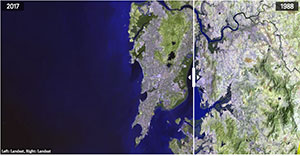 INDIA – It’s almost a ritual: At least on one day every year, the heavens above Mumbai open up, and the metropolis of some 20 million below is inundated. The resultant outrage, inconvenience, and suffering are something of a tradition, with successive governments getting pilloried for their lack of preparedness despite the regularity with which the monsoon paralyses India’s financial capital. Some things never change. The latest act was on Aug. 29, when Mumbai ground to a near-complete halt once again after parts of the city received 298 mm of rain within a nine-hour period. Five people have died so far, and more rain is expected.The city’s inability to weather such downpours is a result of a combination of the failure to improve its drainage system and the unbridled development that has stymied the region’s natural capacity to absorb heavy rainfall. READ MORE Big investors still destroying protected mangroves  THAILAND – Almost 100 mangrove forests in Nuea Klong district were found to be encroached upon before the White Sharks of the Marine and Coastal Resources department (DMCR) raided and seized them. DMCR deputy chief Sophon Thongdee, said the land plots are part of forest reserves, including the pristine Klong Nuea Klong Reserve as well as the nationally declared mangrove forests protected under a Cabinet resolution. Designated mangroves cannot be encroached upon, nor land deeds issued. However, the department’s taskforce has people claiming to be owners have grown oil palms and rubber trees on the land. A natural waterway has also been drained, leaving an inland mangroves stand dead. Big investors are believed by the department to be behind this illegal action. The taskforce also went to inspect Lanta Noi Island in Koh Lan Ta district, where they found the landowners ignored court orders for them to leave. More documents issued for land plots on the island are also under investigation, said Ratchai Pornpa, the taskforce’s chief. The latest effort is part of an attempt to take protected coastal areas including mangroves back from large investors. The department has managed to reclaim 36,000 rai of mangroves nationwide, of which 14,000 rai have been rehabilitated. READ MORE Mangrove info centre now open  INDIA – To impart knowledge on the relevance of protecting mangroves in a world impacted by climate change, social forestry wing under the state forest department has established a Mangrove Information Centre at Malippuram. The centre, spread over 2km in a mangrove forest, is situated adjacent to the aqua tourism centre of Matsyafed. It provides information regarding 10 species of mangroves growing in the coastal areas of Ernakulam district. Ten mangrove saplings from each species has been protected with fencing. The seating facility, swing, walkway, bamboo hut and miniature statues of various birds living in the mangrove forest are the other features at the centre. "We established the centre with the aim of spreading awareness on the mangrove ecosystem among the public, especially students. This is the first time that a centre has been established in Kerala to provide information exclusively on mangroves. We won't allow visitors to carry plastic inside the forest. There would be an entry fee of Rs 10," said K J Martin Lowel, assistant conservator of forests, Ernakulam. READ MORE Navy plants mangroves on Independence Day 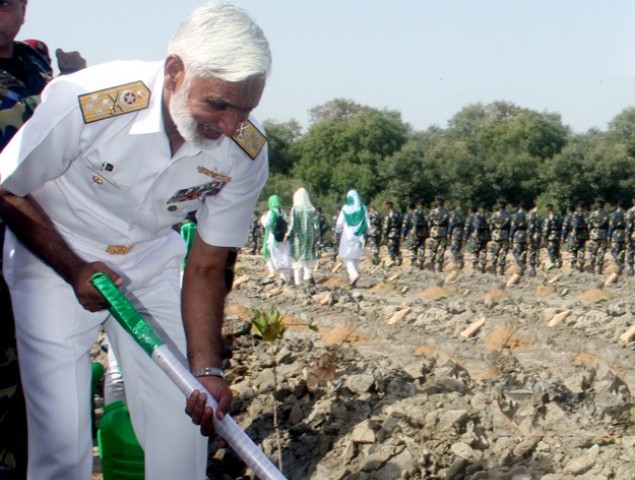 PAKISTAN – On the eve of Independence Day, Pakistan Navy launched a mangrove plantation campaign in the coastal areas of Sindh and Balochistan. Chief of the Naval Staff Admiral Muhammad Zakaullah inaugurated the campaign, titled ‘Pakistan Navy – Mangroves Plantation Campaign 2017’, by planting mangrove saplings. The campaign is part of the plan to plant over one million mangroves in the coastal areas of Pakistan. Speaking on the occasion, the naval chief highlighted that deforestation of mangroves has not only affected biodiversity of the country’s coastal areas but also livelihoods of the communities living along the coast. Admiral Zakaullah elaborated that such campaigns will not only increase the mangrove forest cover but also play a key role in creating awareness among the public about the importance of these forests. The naval chief urged all the relevant federal and provincial institutions and the public to join hands for the cause. READ MORE AMERICAS The secret history of a hurricane hidden in Miami’s mangrove forest USA – For the last quarter century, Michael Ross, a landscape ecologist at Florida International University, has been visiting the same stand of mangroves on southern Biscayne Bay, year after year, taking students to record the recovery of a forest wiped out by Hurricane Andrew. Today, the destruction of a quarter century ago is invisible to passing boaters and nobody else in their right mind — aside from Ross and his students — would willingly endure the agony of hiking here on foot. It means muscling through the head-high thickets of mangroves, sinking into knee-deep muck and slapping at clouds of salt marsh mosquitoes. But what Ross has documented over the years has been dramatic — the little-known cycles of a vital South Florida ecosystem healing itself from what looked like a fatal wound. Everywhere, the coastal forest lay dying, trees amputated at their bases. There were years of rot, the slow sprout of seedlings, then the biggest growth spurt ever recorded in a mangrove forest, along with a see-saw shift in species, before everything balanced out again. But at a only one-third of the coastal forest’s orginal height. READ MORE OCEANA Kabi Kabi Traditional Owners help monitor mangrove health  AUSTRALIA – Over the last 18 months the mangrove and saltmarsh communities along the Maroochy and Mooloolah estuaries have been under the spotlight. Members of Bunya Bunya Country Aboriginal Corporation have been working with Professor Norm Duke and Jock McKenzie of MangroveWatch. Substantial support from the Queensland Government has enabled these groups to record and monitor the condition and extent of mangroves and saltmarsh in these areas. Through the use of a boat and video imaging, the condition of these important wetland and tidal communities has been captured. These recordings are now being analysed and collated by MangroveWatch and a report will be available soon. Such information provides a baseline or historical scenario that can be visited again with future condition assessments of the Maroochy and Mooloolah estuaries to help track and manage any detrimental changes to our local rivers. Such projects support local Kabi Kabi Traditional Owners and historically connected Aboriginal People to work with MangroveWatch, Healthy Land & Water, together with the south east Queensland 'Saltmarsh for Life'. Activities also included recording of Aboriginal sites and the vulnerable Water mouse nests, weed control at Twin Waters West and dating of significant and old Grey mangroves. READ MORE
Dear friends and fellow mangrove conservationists, Recently I learnt of a plan to destroy mangroves in New Zealand. A bill is before Government to authorize the legal destruction of NZ's mangrove resources. The plan is dressed up as "management".The theme of this is not management.It is eradication. The driving forces behind this plan seem to be marinas and boats. The eco-economics of mangrove resources such as their outstandingly important role in protecting valuable dairy farm land from inundation: in the Hauraki region of NZ,we have mangrove stands which protect the stop banks which,themselves, seek to protect low lying farmlands. In addition, these mangroves sustain coastal fisheries. I have been doing the science associated with the wisdom of our mangroves,unispecific ecosystems of Avicennia marina, since 1969 and are shocked at the whole idea.I have a paper on the economic importance of NZ mangroves ( 1976) published by the (then) National Environment Council in which the eco-engineering values of these Hauraki mangroves was strongly stated and respected by local environmental engineers. A move to remove mangrove vegetation along the lines advocated by this bill before Government would place New Zealand, a developed country, in start contrast to the so-called developing nations like Thailand who place a high value on these eco-economic multi-functional assets. I feel that it is my duty to share this unwanted News Flash with MAP ! Prof Gordon S.Maxwell, FRSB,FLS and Life member, ISME. Prof Gordon S. Maxwell FSB, FLS
| ACTION ALERTSAll Expenses Paid Workshop on Ocean Tipping Points A Workshop for Scientists and Natural Resource Managers – Apply Now! The Ocean Tipping Points Project is offering an all-expenses paid 3-day training in Santa Barbara, CA, November 1-3, 2017. HOW TO APPLY The Environmental Leadership and Training Initiative (ELTI) at the Yale School of Forestry & Environmental Studies is pleased to announce our upcoming online training course that will take place from September 25 to November 5, 2017, entitled: Tropical Forest Restoration in Human-Dominated Landscapes VIEW MORE EPIC REPORT Download the paper ‘Mangrove Restoration: to plant or not to plant’, available in 7 languages. VOLUNTEER OPPORTUNITYBecome a volunteer at Gunjur Environmental Protection and Development Group (Gambia) GEPADG, see the photos below on some volunteer activities. http://gepadg.jilankanet.com/our-volunteers/4548872938The Value of Mangrove Forests View Video Protecting the sea for people: a new WFF video on the Philippines largest marine protect area CBEMR Experience Exchange MAP 2017 English Subtitles The world's largest mangrove forest is in danger from a massive coal plant. Mangroves: Guidebook to Malaysia – available for download here Want to learn more about mangroves? SHARE MAP'S VISION Marvellous Mangroves Curriculum Marvellous Mangroves Curriculum in Bangladesh – WATCH VIDEO FOR MORE ON MAPs AWARD WINNING CHINA MANGROVE CURRICULUM VISIT Check out our presentation for more details on Marvellous Mangroves “Education In The Mangroves" can now be seen on the PhotoPhilanthropy website here! Read this 10 page history of the development of MAP’s educational curriculum VIEW DOCUMENT FREE MAP Mangrove e-cards CLICK HERE Donate to MAP via Paypal Green Planet Fundraising Assists MAP – LEARN MORE Volunteer Opportunities with Mangrove Action Project CLICK HERE MANGROVE ISSUES Mangrove Restoration in Asia – Watch Short Video "Question Your Shrimp" Campaign Learn more about the affects of the shrimp industry on mangroves by visiting our blog Information sheds clear light on shrimp-mangrove connection Join MAP on Facebook Sign the Consumer's Pledge to avoid imported shrimp Not yet a MAP News subscriber? Note to Our Readers: We strive to keep active links in our newsletter. However, due to circumstances beyond our control, occasionally links to stories may become broken. If you find a link to a story is not functioning, please cut and paste the headline into your browser search bar. In most cases you should be able to locate the original story. Help Mangrove Action Project through your recycled E-Waste. List of Accepted E-waste Items: |
Mangrove Action ProjectClick here to view past newsletters | |





